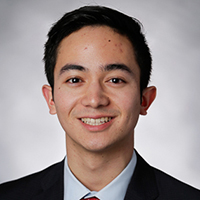
Current Position: Project Mechanical Engineer at Lutron Electronics (Catonsville, Md.)
- Undergraduate: BS in Mechanical Engineering, Duke University
- Duke MEMS Path: MEng in Mechanical Engineering—Thermal Fluids Core (4+1 program), 2017
Why did you choose Duke for your graduate degree?
I choose Duke because I could finish my master's degree in one year.
I did not think about a different university because I loved my time as a Duke engineering undergraduate so much. You'd be surprised how much this engineering department has to offer, despite its small size in comparison to larger technical universities. In my opinion, it's the perfect size for students to have access to resources and showcase their interests and talents.
Tell us about your career.
My job as project mechanical engineer includes finding new ways to manufacture existing company products cheaper and easier. In addition, I help find the manufacturing issues that cause supply chain and distribution problems. My goal in a few months is to work on the design teams for the new products that my company is developing.
How did your time at Duke prepare you for your current job?
My undergraduate years at Duke solidified my conceptual understanding of engineering principles, all of which give me confidence when I apply that knowledge to the workplace. The work that I had to complete in those four years, and in my fifth year for the Master of Engineering (MEng) degree, trained me to overcome difficulty, think creatively, and work effectively with different types of people. My graduate year helped me mentally prepare to be an engineering professional. The teams I worked with in classes operated in a serious manner, treated all assignments and team members with respect, and bonded together after observing the excellent work that we would deliver.
What was the most valuable part of your Duke experience?
The faculty and staff here were the most valuable resource of my Duke experience, and I wish I had been more open with them earlier in my time at Duke. The professors in some of my favorite classes are amazing resources outside of class. They care immensely about a student when they see him or her be passionate about learning rather than just obtaining good grades. And, if you demonstrate genuine interest in a subject area, they will immediately connect you to someone who can help further your pursuit of that interest with their expansive network of colleagues and past students. With all the entrepreneurship happening at Duke, professors keep the most up-to-date tabs on projects and startup ideas worked on by fellow students, and can best connect you with individuals you can collaborate with.
What were the most useful courses you took at Duke?
Heat and Mass Transfer—this course ironed out the thermodynamic fundamentals that have developed into the cornerstones of my engineering expertise. Understanding how heat flows and its similarity to all other energy flows like fluids and electricity give me the confidence to understand and optimize designs and processes.
Management in High-Tech Corporations—this course taught me the soft skills required to get work done most efficiently with a diverse group of people and personalities. It required a lot of introspection, which I enjoyed, and challenged me to imagine my ideal self in the future and to start embodying and strengthening my leadership characteristics. I am sure that even in the twilight of my career, lessons from this class will still resonate within me.
Design with Constructal Theory—this thermodynamic-based course demonstrated the thought process I must have to optimize any design that I could think of. The work required me to break down a design or process into its fundamental components and make a definite conclusion using thermodynamic analysis.
What advice would you give to someone considering a master's degree in MEMS at Duke?
Talk to professors about any interest of yours, even if it is not related to that professor's area of research. They will always steer you in the direction of the next best person who can fulfill your interest. The program at Duke is flexible, so you can tailor your classes to develop upon a specific related interest. For example, I'm interested in the future of agriculture and how mechanical engineering, automation, and sustainability will impact its evolution. The classes and independent studies I undertook in my graduate year provided me new knowledge that would be useful if applied to agriculture, and the MEMS Department approved courses even outside the MEMS department because they still advanced my understanding and pursuit of my interest.
